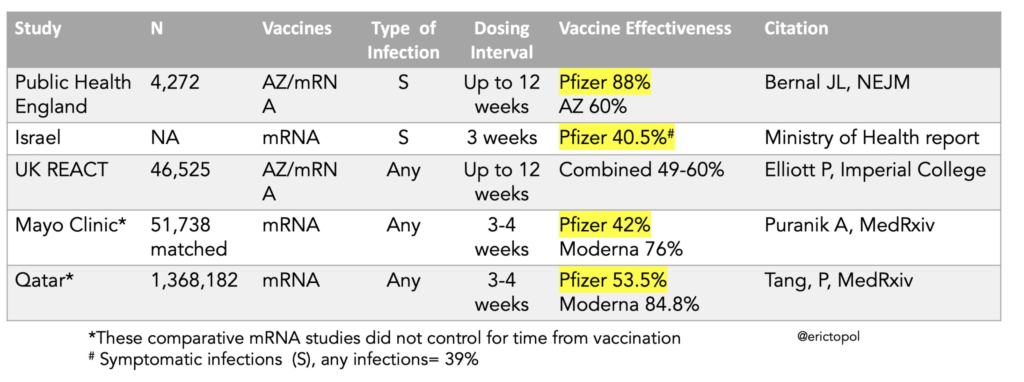Testing
Three dogs have been trained in Vancouver to sniff out COVID-19 with very high accuracy!
Transmission
Yow! This preprint says that 6.8% of COVID-19 patients in England caught it in the hospital.
Vaccines
Good news! Adolescents tolerated two doses of Moderna, and the vax arm had no cases vs. four in the placebo arm. (The numbers are probably too small to be entirely meaningful, but this gets us a step closer to have Moderna approved for teens.)
Variants
This study from Qatar looked at vaccine effectiveness against Delta.
| Pfizer | Moderna | |
| Against asymptomatic infection, 1 dose | 64.2% | 79.0% |
| Against asymptomatic infection, 2 doses | 53.5% | 84.8% |
| Against severe outcome, 2 doses | 89.7% | 100% |
This looks really strange to me. Pfizer worse after two doses?? The paper did say that there was a long time between doses, but still, this seems really anomalous.
This preprint from England says that Pfizer and AZ are still effective against Delta.
| vs. Alpha | vs. Delta | |
| Pfizer or AZ 1 dose | 48.7% | 30.7% |
| Pfizer 2 doses | 93.7% | 88.0% |
| AZ 2 doses | 74.5% | 67.0% |

Notwithstanding the previous paper, there have been a lot of papers which suggest that immunity against Delta is, well, crap. This tweet has this summary graphic:

The Public Health England study is very good, from what I can tell, and it says that the effectiveness against Delta is fine.
The Israel study is confounded by the fact that the most recent outbreak happened to happen in a well-vaccinated area, and some more socially isolated/insular groups didn’t get hit until later.
The Mayo study’s vaccinated cohort was from Minnesota and the unvaxxed cohort was from Minnesota, Wisconsin, Arizona, Florida, and Iowa: areas with different case loads and prior infection possibility.
In the REACT study:
- They mailed testing swabs to random addresses in England and asked people to take swabs and return them. They might not have done it right. You can imagine them not sticking it in far enough, which would give a false negative.
- They asked people to self-report. When they used that data, they estimated a vaccine effectiveness of 62%. They asked the participants for permission to access their health records. For the ones who agreed, the vaccine effectiveness was 62% against asymptomatic infection, meaning either there was some self-selection, some underlying confounding variable, or I suppose people misremembering or lying.
- In England at that time, being vaccinated correlated strongly with age.
- This was the 13th such study. Over time, the percent of people actually responding has dropped from 30% to 11%. There are dangers that the sample is becoming less representative; It is also possible that mischief in reporting is more likely with the smaller sample return size.
The bottom line is… I don’t know. I would tend to trust the Public Health England numbers more, and those say that the vaccine effectiveness is still quite good. But it’s disquieting that there have been multiple studies which say the effectiveness has dropped.
NB: England and the US mostly had a short (3- or 4-week dosing interval), while Canada has mostly had a longer dosing interval (12- or 7-week). There isn’t a lot of data out on longer dosing intervals, but the data which is out plus everything they know from other vaccines is that the longer dose should give more durable/longer-lasting protection.
I have no explanation for the Qatar study and am out of time to dig deeper.
This preprint gives further evidence that breakthrough Delta cases carry as much Delta in their noses as unvaccinated people.
Recommended Reading
This article is on a radically different / cheaper / easier way to manufacture vaccines. (Paywalled)
This article talks about what the end game for the pandemic looks like.
This article talks about kids and Delta (USA focused).
